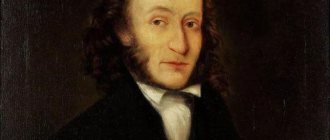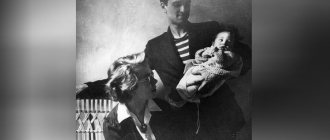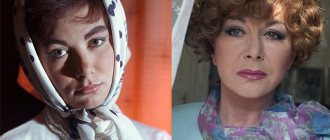short biography
Giuseppe Fortunino Francesco Verdi
(Italian: Giuseppe Fortunino Francesco Verdi, October 10, 1813, in the Italian village of Le Roncole, located in the northern part of Lombardy, on a lower tributary of the Po River, near the city of Busseto, French Empire - January 27, 1901, Milan, Italy) - Italian composer , whose work is one of the greatest achievements of world opera and the culmination of the development of Italian opera of the 19th century.
The composer created 26 operas and one requiem. The composer's best operas: Un ballo in maschera, Rigoletto, Trovatore, La Traviata. The pinnacle of creativity is the latest operas: “Aida”, “Othello”, “Falstaff”.
Early life
The celebrated composer Giuseppe Verdi was born Giuseppe Fortunino Francesco Verdi on October 9 or 10, 1813 in the community. Le Roncol, near Busseto in the province of Parma, Italy. His mother, Luidia Uttini, worked as a spinner, and his father, Carlo Giuseppe Verdi, made his living as a local innkeeper.
Verdi first developed his musical talents at a young age, after moving with his family from Le Roncol to the nearby town of Busseto. There he began to study musical composition. In 1832, Verdi applied to enter the Milan Conservatory, but was rejected due to his age. Subsequently, he began to study with Vincenzo Lavigna, a famous composer from Milan.
Early period
Verdi was born into the family of Carlo Giuseppe Verdi and Luigi Uttini in Le Roncole, a village near Busseto in the department of Tarot, which at that time was part of the First French Empire after the annexation of the principalities of Parma and Piacenza. Thus, the future great Italian composer was officially born in France.
Verdi was born in 1813 (the same year as Richard Wagner
, in the future his main rival and leading composer of the German opera school) in Le Roncole, near Busseto (Duchy of Parma). The composer's father, Carlo Verdi, ran a village tavern, and his mother, Luigia Uttini, was a spinner. The family lived poorly, and Giuseppe's childhood was difficult. He helped celebrate mass in the village church. He studied musical literacy and playing the organ with Pietro Baistrocchi. Noticing their son's passion for music, his parents gave Giuseppe a spinet. The composer kept this very imperfect instrument until the end of his life.
The musically gifted boy was noticed by Antonio Barezzi, a wealthy merchant and music lover from the neighboring city of Busseto. He believed that Verdi would become not an innkeeper or a village organist, but a great composer. On the advice of Barezzi, ten-year-old Verdi moved to Busseto to study. Thus began a new, even more difficult period of life - the years of adolescence and youth. On Sundays, Giuseppe went to Le Roncole, where he played the organ during mass. Verdi also got a composition teacher - Fernando Provesi, director of the Philharmonic Society of Busseto. Provesi was not only engaged in counterpoint, he awakened in Verdi a craving for serious reading. Giuseppe's attention is attracted by the classics of world literature - Shakespeare, Dante, Goethe, Schiller. One of his most beloved works is the novel “The Betrothed” by the great Italian writer Alessandro Manzoni.
In Milan, where Verdi went at the age of eighteen to continue his education, he was not accepted into the Conservatory (today named after Verdi) “due to the low level of piano playing; In addition, there were age restrictions at the conservatory.” Verdi began taking private counterpoint lessons, while attending opera performances, as well as just concerts. Communication with the Milanese elite convinced him to seriously think about a career as a theater composer.
Returning to Busseto, with the support of Antonio Barezzi (a local merchant and music lover who supported Verdi's musical ambitions), Verdi gave his first public performance at the Barezzi house in 1830.
Fascinated by Verdi's musical gift, Barezzi invites him to become a music teacher for his daughter Margherita. Soon the young people fell deeply in love with each other and on May 4, 1836, Verdi married Margherita Barezzi. Margarita soon gave birth to two children: Virginia Maria Louise (March 26, 1837 - August 12, 1838) and Icilio Romano (July 11, 1838 - October 22, 1839). While Verdi was working on his first opera, both children died in infancy. Some time later (June 18, 1840), at the age of 26, the composer’s wife Margarita died of encephalitis.
Childhood
Giuseppe Verdi was born on October 10 in Le Roncole, an area near the city of Busseto, Parma province. It just so happened that the child was very lucky - he became one of the few people of that time who had the honor of being born during the emergence of the First French Republic. Moreover, Verdi’s date of birth is also connected with another event - the birth on the same day of Richardo Wagner, who later became the composer’s sworn enemy and constantly tried to compete with him in the musical field.
Giuseppe's father was a landowner and ran a large village tavern for those times. The mother was an ordinary spinner who sometimes worked as a laundress and nanny. Despite the fact that Giuseppe was the only child in the family, they lived very poorly, like most of the residents of Le Roncole. Of course, my father had some connections and was familiar with the managers of other, more famous taverns, but they were only enough to buy the bare essentials to support the family. Only occasionally did Giuseppe and his parents go to Busseto for fairs, which began in early spring and lasted almost until mid-summer.
Verdi spent most of his childhood in church, where he learned to read and write. At the same time, he helped the local ministers, who in return fed him and even taught him how to play the organ. It was here that Giuseppe first saw a beautiful, huge and majestic organ - an instrument that from the first second captivated him with its sound and made him fall in love forever. By the way, as soon as the son began to type the first notes on the new instrument, his parents gave him a spinet. According to the composer himself, this was a turning point in his fate, and he kept the expensive gift for the rest of his life.
Initial recognition
Oberto , Count Bonifacio)
) at La Scala in Milan was acclaimed by critics, after which the theater impresario, Bartolomeo Merelli, offered Verdi a contract to write two operas.
They became “King for an Hour” ( Un giorno di regno
) and “Nabucco” (“Nebuchadnezzar”).
Verdi's wife and two children died while he was working on the first of these two operas. After its failure, the composer wanted to stop writing opera music. However, the premiere of Nabucco on March 9, 1842 at La Scala was a great success and established Verdi's reputation as an opera composer. Over the next year, the opera was staged 65 times in Europe and has since occupied a strong place in the repertoire of the world's leading opera houses. Nabucco was followed by several operas, including I Lombardi alla prima crociata
and Ernani
,
which were staged and met with success in Italy.
In 1847, the opera "The Lombards", rewritten and renamed "Jerusalem "
), was produced by the Paris Opera on November 26, 1847, becoming Verdi's first work in the
grand opera
. To do this, the composer had to rework this opera somewhat and replace the Italian characters with French ones.
Master
At the age of thirty-eight, Verdi began an affair with Giuseppina Strepponi, a soprano singer who was by then finishing her career (they married only eleven years later, and their cohabitation before the wedding was considered scandalous in many of the places where they lived) . Soon Giuseppina stopped performing, and Verdi, following the example of Gioachino Rossini, decided to end his career with his wife. He was wealthy, famous and in love. It may have been Giuseppina who convinced him to continue writing operas. The first opera written by Verdi after his “retirement” became his first masterpiece - “Rigoletto”. The libretto of the opera, based on Victor Hugo's play The King Amuses himself, underwent significant changes to please censors, and the composer intended to quit work several times until the opera was finally completed. The first production took place in Venice in 1851 and was a great success.
Giuseppina Strepponi
Rigoletto is perhaps one of the best operas in the history of musical theater. Verdi's artistic generosity is presented in full force. Beautiful melodies are scattered throughout the score, arias and ensembles that have become an integral part of the classical operatic repertoire follow each other, and the comic and tragic merge together.
La Traviata, Verdi's next great opera, was composed and staged two years after Rigoletto. The libretto is based on the play “The Lady of the Camellias” by Alexandre Dumas.
This was followed by several more operas, among them the constantly performed today “The Sicilian Supper” ( Les vêpres siciliennes
;
written by order of the Paris Opera), “ Il
, “
Un ballo in maschera
”, “The Force of Destiny” (
La forza del destino
; 1862, written by order of the Imperial Bolshoi Kamenny Theater of St. Petersburg ), second edition of the opera "Macbeth" (
Macbeth
).
In 1869, Verdi composed "Libera Me" for the Requiem in memory of Gioachino Rossini (the remaining parts were written by now little-known Italian composers). In 1874, Verdi wrote his Requiem for the death of his revered writer Alessandro Manzoni, including a revised version of his previously written "Libera Me".
Giuseppe Verdi
One of Verdi's last great operas, Aida, was commissioned by the Egyptian government to celebrate the opening of the Suez Canal. At first Verdi refused. While in Paris, he received a second offer through du Locle. This time Verdi met the opera script, which he liked, and agreed to write the opera.
Verdi and Wagner, each the leader of his own national opera school, always disliked each other. In their entire lives they had never met. Verdi's surviving comments about Wagner and his music are few and unkind (“He always chooses, in vain, the path less traveled, trying to fly where a normal person would simply walk, achieving much better results”). Nevertheless, upon learning that Wagner had died, Verdi said: “How sad! This name has left a huge mark on the history of art.” Only one statement by Wagner is known relating to the music of Verdi. After listening to the Requiem, the great German, always eloquent, always generous with (unflattering) comments in relation to many other composers, said: “It’s better not to say anything.”
Aida was staged in Cairo in 1871 with great success.
Creative activity
Fame and fortune literally pursued Verdi. Within a short time after Strepponi dissuaded her husband from the decision to stop writing music, Giuseppe creates a new masterpiece - Rigoletto. Verdi wrote the libretto inspired by the play “The King Amuses himself” by Victor Hugo. Later, the composer had to rewrite individual fragments of the opera so that it would ideally fit all the standards of the censorship of that time. Giuseppe sometimes lost his nerve, he was irritated by the fact that it was necessary to reshape the plot and meaning for the censors, so he either quit his job or returned to it again. In 1851, the premiere of “Rigoletto” was announced in Venice, where another triumph awaited Giuseppe.
Two years later, the genius finishes work on La Traviata, this time Verdi was inspired by Alexandre Dumas's novel The Lady of the Camellias. One of the best performances of La Traviata belongs to Luciano Pavarotti, watch the video of his performance in Brindisi in 1993:
This is followed by several equally talented works, among which stand out “The Sicilian Vespers” (“Les vêpres siciliennes”), “Troubadour” (“Il Trovatore”), “The Force of Destiny” (“La forza del destino”) and the second edition of the opera “ Macbeth"
In 1869, Giuseppe composed "Libera Me", an addition to the Requiem, which he dedicated to the blessed memory of Gioachino Rossini. Some parts are by several other, lesser-known Italian composers. Verdi reworks this same addition five years later to dedicate it to the death of Alessandro Manzoni, since the writer’s work was close to the composer.
“Aida,” one of the legendary works of genius, was commissioned by the Egyptian authorities for the opening of the Suez Canal. At first Verdi refuses, but when he was in Paris, he received a letter with another offer through Camille du Locle. Then the composer carefully studied the script presented to him and finally agreed to take on the work. Unfortunately, “Aida” is considered one of the last works of genius. In 1871, it was first staged in Cairo, and the public received the work with prolonged applause. It was another success.
Confrontation between Verdi and Wagner
The confrontation between Verdi and Wagner lasted throughout the lives of each side. They were representatives of different opera schools, so they would hardly have been able to find common ground.
They have never met. Verdi's statements about Wagner and his works were laconic and very unkind. Few such comments have survived, but even from them one can understand his thoughts: “People like Wagner always choose the crowd, he tries to fly where anyone else would walk and achieve better results.” When Giuseppe learned of Richard’s death, he said only one phrase: “How sad! Now his name will remain a mark in history.”
Only one statement by Wagner about Verdi's work is known. After listening to his Requiem, Richard, a naturally generous person for rave reviews, which he did not spare for many famous authors, said: “It’s better not to say anything.”
Last years and death
Statue in Piazza Giuseppe Verdi, Busseto
Over the next twelve years, Verdi worked very little, slowly editing some of his earlier works.
Bust of Giuseppe Verdi by Antonio Ugo next to the Teatro Massimo in Palermo, Italy.
Opera Othello
), based on the play by William Shakespeare, was staged in Milan in 1887. The music of this opera is “continuous”; it does not contain the traditional Italian opera division into arias and recitatives - this innovation was introduced under the influence of the operatic reform of Richard Wagner (after the death of the latter). In addition, under the influence of the same Wagnerian reform, the style of the late Verdi acquired a greater degree of recitativeness, which gave the opera the effect of greater realism, although it scared off some fans of traditional Italian opera.
Verdi's grave
Verdi's last opera, Falstaff
), the libretto of which Arrigo Boito, librettist and composer, wrote based on Shakespeare’s play “Merry Wives of Windsor” (
Merry Wives of Windsor
) in its translation into French by Victor Hugo, developed the manner of “through development”. The brilliantly written score of this comedy is thus much closer to Wagner's Die Meistersinger than to the comic operas of Rossini and Mozart. The elusiveness and effervescence of the melodies makes it possible not to delay the development of the plot and creates a unique effect of confusion, so close to the spirit of this Shakespearean comedy. The opera ends with a seven-voice fugue, in which Verdi fully demonstrates his brilliant mastery of counterpoint.
Verdi Memorial in Parma
On January 21, 1901, while staying at the Grand Et De Milan Hotel (Milan, Italy), Verdi suffered a stroke. Being stricken with paralysis, he could read with his inner ear the scores of the operas “La Bohème” and “Tosca” by Puccini, “Pagliacci” by Leoncavallo, “The Queen of Spades” by Tchaikovsky, but what he thought about these operas written by his immediate and worthy heirs remained unknown . Verdi grew weaker every day and six days later, early in the morning of January 27, 1901, he died.
Verdi was originally buried in the Monumental Cemetery in Milan. A month later, his body was transferred to Casa Di Riposo in Musicisti, also in Milan, a rest home for retired musicians that Verdi had created.
He was an agnostic. His second wife, Giuseppina Strepponi, described him as "a man of little faith."
Musical works of Giuseppe Verdi
| Rigoletto - “The Heart of a Beauty” |
| "Tosca" (from Puccini's opera). Spanish Vanessa Mae |
| "Sicilian Vespers" (Theme from The Godfather) |
| "Drinking" Luciano Pavarotti, Placido Domingo, Jose Carreras |
| "La Traviata - Drinking Song", Spanish. Ivan Kozlovsky |
| "Triumphal March" |
| "The Duke's Song. Creek" |
| "Chorus of Captive Jews" from the opera "Nabucco" |
| Requiem "9. Confutatis" |
| Rigoletto "Gilda" - Maria Callas |
| Troubadour - "Leonora's Aria" |
Similar:
| Con Te Partiro, opera "Aida" (Francesco Sartori (music) and Lucio Quarantoto (text)) |
Films and TV series about the life and work of G. Verdi
- “Giuseppe Verdi” (in Russian known as “The Story of a Life”; 1938, Italy). Directed by Carmine Gallone. Starring Fosco Giachetti.
- "Giuseppe Verdi" (1953, Italy). Director: Raffaello Matarazzo. In ch. role: Pierre Cressois.
- “The Life of Giuseppe Verdi (Verdi)” (1982, Italy - France - Germany - Great Britain [en] - Sweden). Director: Renato Castellani. Starring Ronald Pickup.
Giuseppe Verdi died
January 27, 1901 in Milan. He was buried in the Monumental Cemetery in Milan. National mourning was declared throughout Italy. At the composer's funeral, a choir from his opera Nabucco was performed.
A month later, the body of the great composer was transferred to Casa Di Riposo in Musicisti, a holiday home for retired musicians that Verdi created.
Style
Verdi's predecessors who influenced his work were Rossini, Bellini, Meyerbeer and, most importantly, Donizetti. The last two operas, Othello and Falstaff, show the influence of Richard Wagner. Respecting Gounod, whom his contemporaries considered the greatest composer of the era, Verdi nevertheless did not borrow anything from the great Frenchman. Some passages in Aida indicate the composer's familiarity with the works of Mikhail Glinka, whom Franz Liszt popularized in Western Europe after returning from a tour of Russia.
Throughout his career, Verdi refused to use high C in tenor parts, citing the fact that the opportunity to sing that particular note in front of a full audience distracted performers before, after, and while singing the note.
Although Verdi's orchestration is at times masterful, the composer relied mainly on his melodic gifts to express the emotions of the characters and the drama of the action. Indeed, very often in Verdi's operas, especially during solo vocal numbers, the harmony is deliberately ascetic, and the entire orchestra sounds like one accompanying instrument (Verdi is credited with the words: “The orchestra is a big guitar!” Some critics argue that Verdi paid attention to technical aspect of the score is not given enough attention because it lacks school and refinement. Verdi himself once said, “Of all composers, I am the least knowledgeable.” But he hastened to add, “I say this seriously, but by “knowledge” I do not mean knowledge of music at all "
However, it would be incorrect to say that Verdi underestimated the expressive power of the orchestra and did not know how to use it to the fullest when he needed it. Moreover, orchestral and contrapuntal innovation (for example, the strings soaring across the chromatic scale in the Monterone scene in Rigoletto, in order to emphasize the drama of the situation, or, also in Rigoletto, the chorus humming close notes offstage, depicting, quite effectively, the approaching storm) is characteristic of Verdi's work - so characteristic that other composers did not dare to borrow some of his bold techniques because of their instant recognition.
Verdi was the first composer to specifically search for a plot for a libretto that would best suit the characteristics of his talent as a composer. Working in close collaboration with librettists and knowing that dramatic expression was the main strength of his talent, he sought to eliminate “unnecessary” details and “superfluous” characters from the plot, leaving only characters in which passions boil and scenes rich in drama.
Tough Love
How difficult it was for her with him! They went to Busseto, the town where Verdi was born and spent his childhood, and it was a nightmare. They did not receive anyone, did not go out anywhere, if Verdi met acquaintances, he pursed his lips and nodded arrogantly. This broke the heart of the affable Giuseppina. But that would be okay - in Busseto she was considered simply the mistress of a brilliant fellow countryman, and when they met, everyone was in a hurry to express their contempt for her.
If she walked down the street alone, no one even greeted her.
In this conclusion, Verdi was almost happy. He took great pleasure in grumbling at the servants, making sarcastic remarks about the neighbors, and snorting at Giuseppina. Suddenly I became interested in agriculture, in the morning I took the dogs and went to the fields to check the crops. Who would now recognize the genius in this meticulous farmer! Giuseppina said:
“Verdi’s love for rural life became a mania, madness, madness.”
Did Joseppina suffer from such a life? Yes. Did she escape from this despot into her usual artistic environment? Where there! Verdi finally decided to marry her, and they got married secretly. There was no celebration, nothing was said to friends, and the witnesses were the coachman and the bell-ringer.
The great composer definitely knew how to turn a woman's head!
Operas by Giuseppe Verdi
Giuseppe Verdi in Vanity Fair
, 1879
- Oberto, Count of San Bonifacio
— 1839 - King for an Hour (Un Giorno di Regno)
— 1840 - Nabucco, or Nebuchadnezzar (Nabucco)
— 1842 - Lombards in the First Crusade (I Lombardi')
— 1843 - Ernani
- 1844. Based on the play of the same name by Victor Hugo - Two Foscari (I due Foscari)
- 1844. Based on the play by Lord Byron - Joan of Arc (Giovanna d'Arco)
- 1845. Based on the play "The Maid of Orleans" by Schiller - Alzira
- 1845. Based on the play of the same name by Voltaire - Attila
- 1846. Based on the play “Attila, Leader of the Huns” by Zacharius Werner - Macbeth
- 1847. Based on Shakespeare's play of the same name - The Robbers (I masnadieri)
- 1847. Based on the play of the same name by Schiller - Jerusalem (Jérusalem)
- 1847 (
Lombard
) - The Corsair (Il corsaro)
- 1848. Based on the poem of the same name by Lord Byron - The Battle of Legnano (La battaglia di Legnano)
- 1849. Based on the play “The Battle of Toulouse” by Joseph Mery - Louisa Miller
- 1849. Based on the play “Cunning and Love” by Schiller - Stiffelio
- 1850. Based on the play “The Holy Father, or the Gospel and the Heart,” by Emile Souvestre and Eugene Bourgeois. - Rigoletto
- 1851. Based on the play “The King Amuses himself” by Victor Hugo - The Troubadour (Il Trovatore)
- 1853. Based on the play of the same name by Antonio García Gutierrez - La Traviata
- 1853. Based on the play “The Lady of the Camellias” by A. Dumas the Son - Sicilian Vespers (Les vêpres siciliennes)
- 1855. Based on the play “The Duke of Alba” by Eugene Scribe and Charles Devereux - Giovanna de Guzman
(Version of "Sicilian Vespers"). - Simon Boccanegra
- 1857. Based on the play of the same name by Antonio Garcia Gutierrez. - Aroldo
- 1857 (Stiffelio version) - Masquerade Ball (Un ballo in maschera)
- 1859. Based on the real murder of Gustav III, which formed the basis of the play by Eugene Scribe - The Force of Destiny (La forza del destino)
- 1862. Based on the play “Don Alvaro, or the Force of Destiny” by Angel de Saavedra, Duke of Rivas. The premiere took place at the Bolshoi (Kamenny) Theater in St. Petersburg - Macbeth ( Macbeth
) - 1865. Second edition of the opera commissioned by the Paris
Grand Opéra - Don Carlos
- 1867. Based on the play of the same name by Schiller - Aida
- 1871. Premiered at the Khedive's Opera House in Cairo, Egypt - Othello
- 1887. Based on Shakespeare's play of the same name - Falstaff
- 1893. Based on The Merry Wives of Windsor and two parts of Shakespeare's Henry IV
Verdi, Giuseppe
(1813-1901) Italian composer
Giuseppe Verdi became the last great classic in the three-century history of Italian opera. Although it is represented by such masterpieces as the operas of V. Bellini, Gioachino Rossini and G. Donizetti, it was Verdi who turned Italian opera into a truly folk art.
He was born in a small village near the town of Busseto, where his father was an innkeeper. The first instrument the boy learned to play was the old spinet (the predecessor of the harpsichord). The future composer was taught by the organist of the village church of Baystrokki.
Giuseppe Verdi did not stop studying music while studying at school, after which he entered the service in the office of the merchant Antonio Barezzi. Verdi's owner was a great lover of music, and it was in his house that the young man's extraordinary musical talent manifested itself.
Working for a merchant, Giuseppe Verdi, at the age of 15, not only played the organ in the city cathedral, but also conducted the city philharmonic orchestra, replacing the regular conductor.
In 1831, he received a scholarship and went to enter the Milan Conservatory. However, he was not accepted because he came from a lower class background, so he had to take private lessons from the conductor of La Scala, Vincenzo Lavigna.
It was at this time that Giuseppe Verdi had to replace his teacher during one of the concerts. Verdi's performance was so successful that the theater management ordered him to compose an opera. However, material conditions forced Verdi to take the position of director of the Philharmonic Society in Busseto. At the same time, he worked part-time as a church organist in the same city.
Concerts with the participation of Giuseppe Verdi were so popular that residents from all over the city gathered in the church where he played. A turning point in the life of the future composer was 1839, when the premiere of his first opera Oberto took place on the stage of La Scala. It was a huge success, after which Giuseppe Verdi received an order to write several more operas.
In 1842, all of Italy applauded the composer's new operas - Nabucco and Lombards on a Crusade. The theme of liberation from enemy oppression, sounded in their music, caused a huge political resonance. Verdi's operas became so popular that they were staged simultaneously in several cities in Italy.
European fame came to him in 1847, when his opera Macbeth was performed on the stage of the London Theater. After its premiere, Giuseppe Verdi stayed in England for some time, where he received an order for a new opera. However, having learned about the revolution under the leadership of G. Garibaldi, the composer immediately went to Italy and in 1848 wrote the anthem of the Garibaldians. The revolutionary events themselves were reflected in the opera “The Battle of Legnano,” which was staged at the Roman opera in January 1849.
The fifties were the time when Giuseppe Verdi became a living classic of Italian music. In less than ten years, he wrote eight operas, each of which was a masterpiece of this genre. Among them are “Rigoletto”, “Il Trovatore”, “La Traviata”, “Simon Boccanegra”, “Un ballo in maschera”, “Sicilian Vespers”.
The works of Giuseppe Verdi were primarily realistic operas, where brilliant music coexisted with beautiful drama. Verdi carefully worked out the script for each performance, believing that the main thing lay in the hidden drama of the plot. The viewer should not have guessed its outcome until the very end.
The melodies of these works immediately became known throughout Italy. Each of the operas had its own special part, which was repeated throughout the entire action, worked out especially carefully by the composer and was easily interpreted both instrumentally and vocally. That’s why literally the next day after the premiere, the Duke’s song “The Heart of a Beauty Is Prone to Treason” was sung throughout Italy.
It is curious that in Russia the operas of Giuseppe Verdi were not immediately accepted by the public. Even major composers and critics - V. Stasov, A. Serov, P. Tchaikovsky - only appreciated their merits some time later. The reason was that intense drama and vibrant music required extraordinary abilities, which turned out to be beyond the capabilities of the singers and performers available in Russia at that time.
In the next decade, Verdi's work was less intense. But each of his operas was a monumental work. The central place is occupied by the opera “Don Carlos” based on the drama by F. Schiller, as well as “Aida” based on the Egyptian legend.
The operas are striking in their size; their performance lasted no less than five hours. In addition, a large composition of instruments and a huge number of performers were involved. Giuseppe Verdi was fond of folk scenes, so these plays often took place in natural settings: for example, “Aida” was often staged near Cairo against the backdrop of the pyramids.
The composer built the opera on the juxtaposition of large dramatic scenes, in which music played the main role. Moments of different intensity were combined with each other according to the principle of contrast, a lyrical monologue was adjacent to folk scenes.
Giuseppe Verdi strove to create a musical drama where music and drama would be combined into a single whole and each character would receive a complete musical characterization. An example of such an opera is Otello, Verdi's last opera, which premiered in February 1887. The composer himself directed the production and even showed certain scenes to the actors, among whom was the great Italian singer F. Tamagno. The opera was conducted by Arturo Toscanini.
The performance became a true triumph for the composer. All the streets around the theater were filled with people, and after the end of the performance, the audience carried Giuseppe Verdi in their arms to his house.
After the production of Othello, he lived for another 14 years. His last opera was Falstaff. Verdi turned to sacred music, as well as to charitable activities. With funds received from the productions of his operas, he opened a home for elderly musicians.
Giuseppe Verdi died on January 27, 1901 at his Villa San Agata.











